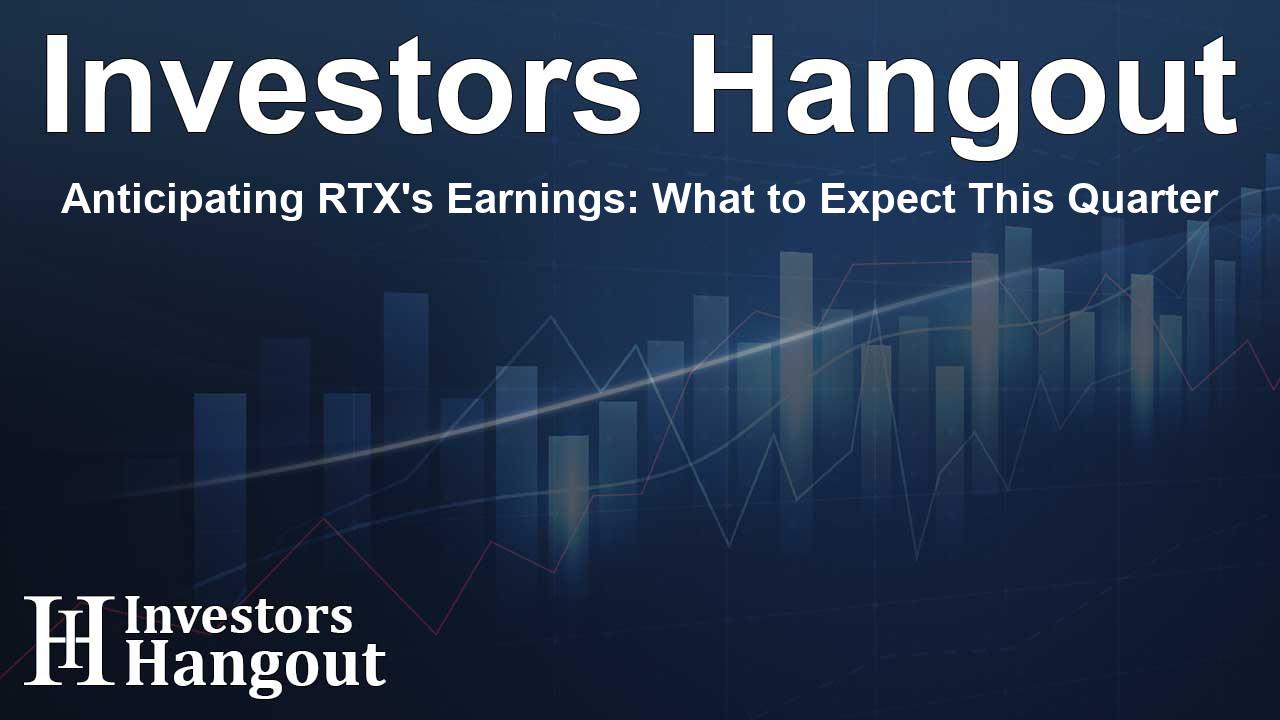Anticipating RTX's Earnings: What to Expect This Quarter

Assessment of RTX's Upcoming Earnings Report
RTX (NYSE: RTX) is gearing up for an important earnings announcement. Investors are eager to see how the company performs, especially in light of market expectations. Anticipation is building around the potential earnings per share (EPS), predicted to be around $1.41. This significant metric will be closely watched by those invested in the aerospace and defense sector.
Understanding EPS and Its Impact
While earnings performance is crucial, market participants should note that stock reactions often pivot on the guidance given by the leadership during earnings calls. Historically, RTX has performed well in past quarters, and investors will be keen to learn if this trend continues.
Past Earnings Performance Highlights
In its last earnings release, RTX exceeded analyst expectations by reporting an EPS of $1.56, beating estimates by $0.12. Following this result, the stock experienced a positive movement, closing up 4.91% the next trading day. Such an outcome raises investor confidence heading into the upcoming report.
Stock Trends and Market Performance
As of the last observation, RTX shares were priced at $157.95, showcasing a robust increase of 27.62% compared to the previous year. This solid performance suggests that many long-term investors feel optimistic about the company's trajectory as it approaches its next earnings announcement.
Market Sentiment and Analyst Recommendations
Market sentiment can heavily influence stock price movements, and analysts share a generally favorable outlook on RTX. With a collective consensus rating of 'Outperform' based on evaluations from nine analysts, the average price target stands at $171.44. This would indicate an appealing potential upside of approximately 8.54% for existing shareholders.
Comparative Analysis with Industry Peers
It's insightful to compare RTX's performance and outlook with notable companies in the aerospace and defense sector, such as Lockheed Martin, GE Aerospace, and General Dynamics. Each of these firms showcases varying degrees of growth and market positioning, with RTX leading in certain metrics.
Peer Review Snapshot
Here's a brief look at the consensus ratings for these competitors:
- Lockheed Martin is rated as 'Neutral', with an average price target of $506, suggesting a considerable potential upside of 220.35%.
- GE Aerospace holds an 'Outperform' rating, with an average price target of $295, indicating an 86.77% potential gain.
- General Dynamics is also rated as 'Outperform', with a forecasted price target of $356.33, suggesting a potential upside of 125.6%.
RTX Financial Overview
RTX emerged from the merger of United Technologies and Raytheon, strategically positioning itself in both commercial aerospace and defense sectors through three main segments: Collins Aerospace, Pratt & Whitney, and Raytheon. This diversified portfolio strengthens its market position.
An Examination of Financial Metrics
Given the context, the financial numbers provide deeper insights:
Market Capitalization: RTX holds a significant market capitalization, validating its established presence within the aerospace and defense landscape.
Revenue Growth: RTX reported a revenue growth rate of 9.43%, though it trails behind some of its industry peers.
Net Profit Margin: With a net margin of 7.68%, RTX illustrates strong profitability, marking effective cost control strategies.
Return on Equity (ROE): At 2.67%, RTX's ROE suggests areas for improvement in capital utilization to enhance shareholder value.
Return on Assets (ROA): RTX's ROA stands at 1.0%, indicating potential challenges in asset efficiency.
Debt Management: The company's debt-to-equity ratio, at 0.7, shows a balanced approach to debt management, lying below industry standards.
Conclusion
Thinking about investing in RTX means looking beyond just EPS. The combination of historical performance, current market sentiment, and guidance will significantly shape investor reactions. As RTX prepares to showcase its financial health, stakeholders should remain alert to the details surrounding its upcoming earnings release.
Frequently Asked Questions
1. When is RTX expected to report its earnings?
RTX is projected to announce its quarterly earnings report imminently, which investors are closely following.
2. What was the last reported EPS for RTX?
The last reported EPS for RTX was $1.56, which was above the analyst’s estimates.
3. How has RTX's stock performed recently?
Recently, RTX's stock price increased by 27.62% over the past 52 weeks, reflecting strong market sentiment.
4. How are analysts rating RTX?
Analysts have given RTX a consensus rating of 'Outperform', indicating favorable market expectations.
5. What factors influence the stock price reactions post-earnings report?
Stock price reactions are generally swayed by the earnings performance and future guidance provided by the management during the earnings call.
About The Author
Contact Ryan Hughes privately here. Or send an email with ATTN: Ryan Hughes as the subject to contact@investorshangout.com.
About Investors Hangout
Investors Hangout is a leading online stock forum for financial discussion and learning, offering a wide range of free tools and resources. It draws in traders of all levels, who exchange market knowledge, investigate trading tactics, and keep an eye on industry developments in real time. Featuring financial articles, stock message boards, quotes, charts, company profiles, and live news updates. Through cooperative learning and a wealth of informational resources, it helps users from novices creating their first portfolios to experts honing their techniques. Join Investors Hangout today: https://investorshangout.com/
The content of this article is based on factual, publicly available information and does not represent legal, financial, or investment advice. Investors Hangout does not offer financial advice, and the author is not a licensed financial advisor. Consult a qualified advisor before making any financial or investment decisions based on this article. This article should not be considered advice to purchase, sell, or hold any securities or other investments. If any of the material provided here is inaccurate, please contact us for corrections.
